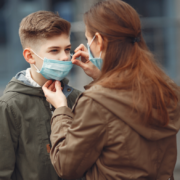Second Wave – Keeping Your Home and Family Safe Through COVID-19
The uncertainty of the COVID-19 era has been the only certainty. How to keep our homes and families as safe as possible as it evolves.
We find ourselves halfway through winter, officially one year into the global pandemic with vaccines only now making their way (albeit sporadically) to essential health care workers and the elderly. What, with travel restrictions enhanced (a $2000 mandatory quarantine upon return from the USA and Mexico, for instance), fines issued to gatherings extending beyond just residents of our households, and masks mandatory in all businesses (just to name a few) we’ve still a very long row to hoe.
Despite the vaccine, the end is seeming nowhere in sight.
As fatigued as we are with COVID-19 and how much it has fundamentally changed daily life, this is not the time to throw in the towel and start giving up. Rather, this is the time to commit more fully to doing all our parts to ensure we behave responsibly to ensure the health and safety of others so as to, in turn, ensure the health and safety of our families and homes.
We want to provide a gentle reminder of how to best manage what has become a surreal ‘new normal’ and reinforce the important recommendations of our expert public health officials. Read on for what you can do to help reduce exposure and do as much as you can do slow the spread of COVID-19 in your community (short of locking yourself indoors until it’s over!) while you keep your housemates and loved ones as healthy as possible as the COVID-19 virus and, now, it’s variants, persist.
Your prevention checklist:
- Staying at least two metres, or six feet, from others – what we’ve come to know as physical or social distancing – is still vital when in public spaces.
- Important tips for preventing spread:
- Face coverings have become a requirement in many public spaces, such as grocery stores, community centres, and gyms. Always keep a face mask handy – one in your purse, in your car’s glove compartment, in your pocket. And require your school-age kids to do likewise.
- Sanitize, sanitize, sanitize. Soap and water and hand sanitiser should be part of your routine before, during, and, most certainly, after spending time in public places.
- Reiterating the point above, frequent hand-washing with soap and water is essential. Wash for at least 20 seconds – sing Happy Birthday all the way through. Hand sanitiser that contains 60% alcohol works on the fly if you don’t have access to soap and water.
- For surfaces that your housemates touch frequently, be sure they’re cleaned and sanitized frequently. Soap and other household detergents combined with water should do the trick. Of course, EPA-registered household disinfectants, are great, too. Ensure that they’re appropriate for the surfaces before you use them.
- When you cough or sneeze, be mindful. Cover your nose and mouth – into the inside of your elbow if a tissue isn’t available. Do NOT keep the tissue for the next use — toss it immediately!
- Mobile phones, TV remotes, laptops, tablets, and other devices can be breeding grounds for virus – sanitize with manufacturer-recommended cleaners frequently.
- The strains on our mental health are truly unprecedented on this scale. It’s important that you stay connected to the emotional wellness of both your housemates as well as other friends and loved ones. Given the ongoing nature of this, we have to be extra vigilant about staying in touch, communicating honestly (though in an age-appropriate way) and calmly about what’s happening.
- Some of the hardest-hit emotionally and physically during this pandemic are those who are alone or completely isolated. Our aged friends and relations, for instance. It’s vital that you make an additional effort to check in often and keep in touch, particularly if they’re alone – video chat, text, phone calls, and even email can help bridge the gap and foster a sense of connection.
- Our teens have been troopers during this time! Do what you can to keep them engaged and connected. As we have to discourage they’re gathering – many understand and are doing it on their own – in large groups. If they aren’t already, limit outings to just school and important appointments and limited time in public.
- Of course, if you feel sick – stay home! Anywhere you need to go will wait until you’re feeling better.
- As much as you can, limit your own exposure to anyone you know who may be feeling unwell.
- If someone in your household is sick: make them comfortable in a room and bathroom, separate from the rest of the family, if you can.
- Don’t share personal items such as food, drinks, etc.
- Be sure that they always have a clean, disposable face mask to wear when they are around the house.
- Keep the room and bathroom they’re using very clean, disinfected, and well-sanitized – as frequently as possible.
- If you suspect that you or someone else in your home is sick, notify the school, work, daycare, or any other obligations immediately. Request to have work sent home.
- Stay up-to-date about COVID-19, in your community, region, the province, and beyond. Subscribe or stay in the information loop about changes in your community, including local outbreaks, school closures, and other changes.
This list is a guideline. A big factor in keeping your loved ones and home safe and healthy is is to stay informed – rely on trusted media sources as well as the guidance and recommendations that your local and provincial public health authorities provide.

